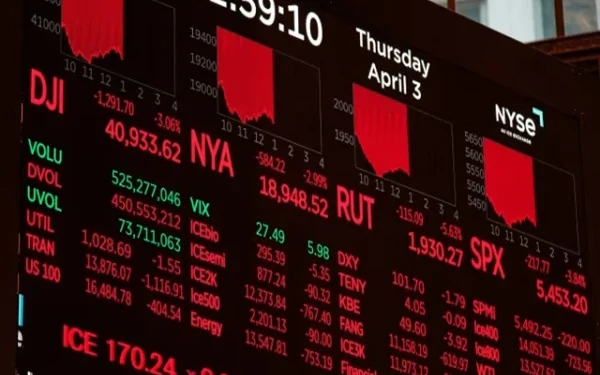New York: Markets Experience Historic Decline Following Tariff Implementation
Wall Street suffered its biggest daily percentage drop in years, as the US stock market reacted negatively to President Donald Trump’s newly implemented tariffs. The sharp decline has fueled fears of a global trade war and potential economic recession, as investors rushed towards safer investment options.
According to reports from foreign news agencies, the tariffs imposed by Trump have significantly disrupted global trade expectations. The President has placed a 10% tariff on most US imports, while other nations are responding with much higher tax rates on American goods. The move has created a ripple effect across financial markets, leading to widespread panic and uncertainty.
Impact of Tariffs on the Global Trading System
The newly imposed tariffs are expected to have severe implications for the global economy. Just months ago, US stock markets were reaching record highs due to business-friendly policies that encouraged investments and economic growth. However, the tariff announcement has reversed this momentum, leading to heightened investor concerns and market volatility.
Market Reaction and Investment Shifts
In response to the turmoil, investors have turned to safer investment options, such as government bonds. Historically, bonds are considered a stable asset in times of financial uncertainty. The movement towards bonds and away from stocks is a clear indication that traders and financial institutions are bracing for prolonged economic challenges.
The uncertainty in the stock market has also resulted in increased demand for gold, another traditional safe-haven investment during times of financial instability. Market analysts suggest that if the current trend continues, Wall Street may witness further losses in the coming weeks.
Global Response to Trump’s Tariffs
The global reaction to the tariffs has been swift, with major trading partners voicing strong opposition.
China’s Retaliation and European Union’s Response
China, one of the largest US trading partners, has threatened to retaliate with its own set of tariffs. The Chinese government has warned that they will introduce countermeasures that could target American industries, including technology, agriculture, and automotive sectors. Given China’s crucial role in the global supply chain, any retaliation could have severe consequences for multinational corporations operating in both countries.
Similarly, the European Union has opposed the 20% tax levied on goods imported from European nations. EU officials have warned that such protectionist policies could lead to a deterioration of diplomatic and economic relations between the US and Europe. The European Union is exploring legal options to challenge the tariffs and has hinted at imposing its own trade barriers against American goods.
Other Affected Nations Seek Exemptions
Several US allies, including South Korea, Mexico, and India, have announced that they will seek waivers from the tariff policies before the April 9 deadline. These countries argue that the tariffs unfairly impact their economies and disrupt long-established trade agreements.
South Korea, a key player in global technology and automobile markets, has urged US officials to reconsider the tariffs or grant exemptions to prevent economic downturns. Mexico, another major trading partner, has emphasized the potential negative impact on North American trade relations, particularly under the US-Mexico-Canada Agreement (USMCA). India, which exports a significant amount of goods to the US, is also pushing for negotiations to reduce the economic impact on its industries.
Investor Anxiety and Economic Outlook
With market uncertainty at an all-time high, investor anxiety continues to grow. Financial experts believe that if diplomatic solutions are not reached quickly, the ongoing trade disputes could lead to a long-term economic slowdown.
The US Federal Reserve has expressed concerns over the volatility in the financial markets and its potential impact on economic stability. Analysts predict that if the trade war escalates, consumer prices in the US could rise due to increased costs of imported goods, which could further strain economic growth.
Market watchers are closely monitoring upcoming government announcements, company earnings reports, and Federal Reserve policies to assess the future trajectory of the economy.
Conclusion: Uncertain Future for Wall Street and Global Trade
The stock market’s sharp decline following Trump’s tariff implementation marks a critical turning point for Wall Street. As global trade partners respond with countermeasures and negotiations unfold, financial markets are expected to remain turbulent in the coming months.
Investors and policymakers will be closely watching the evolving situation to determine the long-term impact of these tariffs on the US and global economies. Whether diplomatic negotiations can ease tensions or whether a full-fledged trade war emerges remains to be seen, but one thing is certain: the financial world is entering a period of unprecedented uncertainty.

























